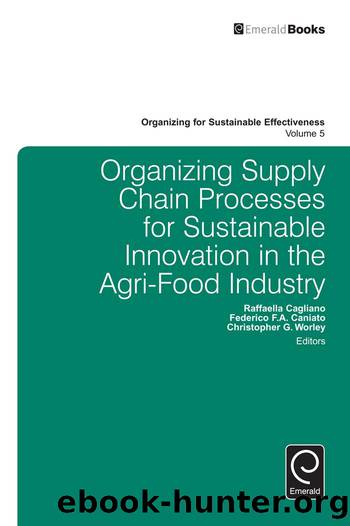Organizing Supply Chain Processes for Sustainable Innovation in the Agri-Food Industry by Cagliano Raffaella;Caniato Frederico;Worley Christopher;

Author:Cagliano, Raffaella;Caniato, Frederico;Worley, Christopher;
Language: eng
Format: epub
Publisher: Emerald Publishing Limited
Published: 2016-08-18T00:00:00+00:00
Concept, Design, and Motivations of the Project
The trigger of the âBuon Fineâ project was the appearance in the Italian landscape of other surplus goods redistribution initiatives. For example, Last Minute Market is a spin-off of the University of Bologna, which was founded in 1998 as a research activity. Since 2003 it has become entrepreneurial and today operates throughout the country by developing local projects aimed at recovery of unsold goods (marketable or not) to support charitable organizations. Right after the Good Samaritan Law (n.155/2003) passed in the Italian parliament, Coop Italia member, Coop Adriatica, started a project with Last Minute Market to redistribute surplus food. This activity became an example for Coop Lombardia.
From Coop Lombardiaâs point of view, their whole system is regulated and somewhat protected by the Good Samaritan Law, an Italian law that identifies food aid organizations as the final consumer of donated products. As a result, food donors are liable for food safety and hygiene conditions only to food aid organizations, but not to individual beneficiaries. The manager says that, âIn the Lombardy region, we tried to activate the redistribution of surplus food immediately; however we found a number of organizational and legal difficulties.â At the time (in 2003), the application of the Good Samaritan Law was not standardized for all regions and this created difficulties in procedures on liabilities.
In fact, it was not possible to realize the initiative until 2005, when the Municipality of Sesto San Giovanni (i.e., a city of 81,000 people located in the Milan metropolitan area) became entitled to a project (within the Agenda 21 supported by United Nations1) from Minister of Environment to reduce the negative environmental impact of large-scale retail trade. The Municipality of Sesto San Giovanni asked available retailers to be involved in the project. Only two retailers responded: Coop Lombardia and a small retailer that no longer exists.
The aim of the project was to reduce the negative environmental impact of supermarket chains and Coop Lombardia proposed redistributing surplus food to non-profit organizations as part of this project. As a coordinator of the project, the Municipality of Sesto San Giovanni orchestrated a meeting between the âsupply (donor)â â Coop Lombardia and its two local stores â and the âdemand (receiver)â â âLotta allâEmarginazioneâ (âFight against Social Exclusionâ) and âLa Grande Casaâ (âThe Large Houseâ). These are two of the most important social cooperatives in the area. Everything was carried out under the supervision of the Hygiene Service of Food and Nutrition (SIAN) and the Health Authority of the City of Milan (ASL). These two organizations supervise all hygiene and sanitary aspects in the area.
This pilot project of surplus food redistribution lasted 18 months. After that Coop Lombardia started to replicate the same system in other areas asking municipalities to collaborate in identifying local non-profit organizations dealing with poverty and food insecurity. As more stores joined the program (Fig. 3), the initiative was named âBuon Fine.â
Download
This site does not store any files on its server. We only index and link to content provided by other sites. Please contact the content providers to delete copyright contents if any and email us, we'll remove relevant links or contents immediately.
Rich Dad Poor Dad by Robert T. Kiyosaki(6633)
Bad Blood by John Carreyrou(6622)
Principles: Life and Work by Ray Dalio(6449)
Playing to Win_ How Strategy Really Works by A.G. Lafley & Roger L. Martin(6308)
Management Strategies for the Cloud Revolution: How Cloud Computing Is Transforming Business and Why You Can't Afford to Be Left Behind by Charles Babcock(4573)
The Confidence Code by Katty Kay(4262)
Thinking in Bets by Annie Duke(4227)
American Kingpin by Nick Bilton(3887)
Delivering Happiness by Tony Hsieh(3426)
Project Animal Farm: An Accidental Journey into the Secret World of Farming and the Truth About Our Food by Sonia Faruqi(3221)
The Power of Habit by Charles Duhigg(3139)
The Tyranny of Metrics by Jerry Z. Muller(3073)
The Marketing Plan Handbook: Develop Big-Picture Marketing Plans for Pennies on the Dollar by Robert W. Bly(3063)
Brotopia by Emily Chang(3056)
Mastering Bitcoin: Programming the Open Blockchain by Andreas M. Antonopoulos(3045)
I Live in the Future & Here's How It Works by Nick Bilton(2997)
The Content Trap by Bharat Anand(2927)
Building a StoryBrand by Donald Miller(2915)
Applied Empathy by Michael Ventura(2904)
